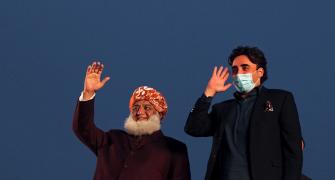The finance ministry has suggested sweeping changes in the country's telecom policy, including permitting private sector telcos to share the infrastructure built by state-owned Bharat Sanchar Nigam Ltd, redefining norms for computation of licence fee revenue and a new spectrum pricing formula.
The ministry has also suggested relaxation in bank guarantee conditions, merging the access deficit charge with the universal service obligation, encouraging the creation of independent telecom infrastructure providers and simplification in the multiple taxation regime imposed on the sector.
In a draft strategy paper prepared by the Department of Economic Affairs on the telecom sector, the ministry pointed out that 'BSNL had created an extensive nationwide infrastructure, which should be extended to private operators as well'.
It has also recommended that the government encourage independent infrastructure providers who would create the assets and then lease it out to operators on a commercial basis.
The paper said sharing the infrastructure would be beneficial for BSNL, which would be able to generate additional revenue and would also help the private operators in reaching out to more people.
The ministry has suggested that in line with many other countries, a 'code of access to telecom infrastructure be formulated so that infrastructure sharing became a matter of right. This will mean transparency in pricing and fair access to facilities owned by the incumbent'.
The paper also suggested redefining the adjusted gross revenue, which formed the basis for the government to calculate the revenue share that telcos pay to the government.
It has recommended that interest on dividend, sales of assets and handsets, revenue from sale of capital goods or leasing of infrastructure, port charges, leased line charges and any other charges paid to an operator, which may be passed through payments be excluded from the AGR calculation.
In order to ensure that resources were not blocked unproductively, the finance ministry also said companies with a net worth of $500 million need not be asked to submit bank guarantees for securitising licence fee and spectrum charges and also roll out obligations.
The note also laid down a roadmap for spectrum allocation. While it said the government must receive an appropriate value for the spectrum, it wanted to change the existing method of spectrum pricing that was based on a fixed percentage of revenue, making it very expensive.
Instead, it suggested 'a cost-based recovery on actual costs incurred by the regulatory authority for management of radio spectrum' be considered. It also favoured the need to provide spectrum free of charge in rural areas.
It criticised the current ADC regime as 'not only non-transparent but difficult to monitor and administer (based on per-minute charge)'.
The paper is of the opinion that as both the USO and the ADC serve the same purpose of ensuring affordable rural access, the two should be merged by switching to a hybrid revenue sharing regime, which is transparent and easy to administer.
The note also takes cognisance of the fact that telecom service providers have multiple taxes, which, apart from ADC, include spectrum charges, sales tax, service tax and education cess.
It has, however, rejected a suggestion by the telcos that the complicated tax regime should be replaced by a single tax akin to a service tax which can be apportioned to intended recipients (like the USO fund etc).
It said since such a tax had to be shared with the states, there should instead 'be a time-bound phasing out of these different types of taxes till they were merged into two or three levies'.
- Private sector telephone firms may be permitted to share the infrastructure built by BSNL
- Relaxation in bank guarantee conditions, encouraging creation of independent telecom infrastructure providers, and simplification in the multiple taxation regime has also been mooted
- Draft calls for creating a 'code of access to telecom infrastructure' so that infrastructure sharing becomes a matter of right and there is transparency in pricing








